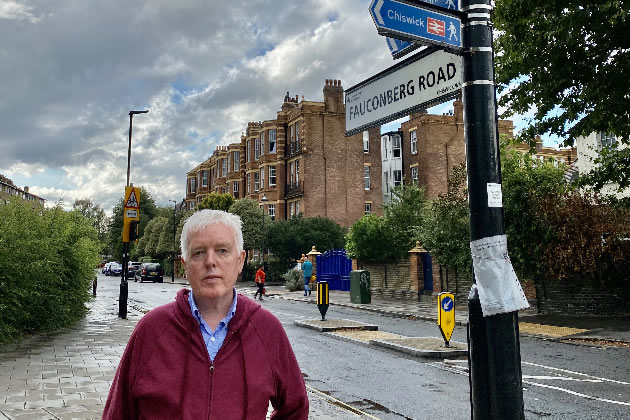Silent Majority Support South Chiswick Traffic Measures Says Resident
Fauconberg Road no longer 'aggressive rat-run' since new restrictions

Picture: Mark Campbell
A Grove Park resident who was a first responder to a serious crash on an “aggressive rat-run” has said work to calm traffic in Chiswick due to coronavirus has “massively improved” the area.
Mark Campbell, who lives in Sutton Court Road, has said walking in the neighbourhood has become “less threatening” and “more friendly” in the last few weeks as Hounslow Council is trialling ways to cut traffic levels in certain parts of the borough.
The council had secured funding from the Mayor of London last year to transform the area as part of a ‘liveable neighbourhood’ scheme but the government’s guidance to authorities in the wake of the coronavirus pandemic sped up the process to make an area designated as South Chiswick a ‘low traffic neighbourhood’.
This means stopping drivers using residential streets to cut through to major roads, by closing streets and changing access to reduce traffic volumes in the area. It is also hoped to encourage more active travel of residents to promote health and environmental benefits.
The scheme has also attracted criticism of road “chaos” from the changes, but Mr Campbell believes he is part of the “silent majority” who believe the move is for the better.
He said, “Until now, my neighbourhood – the narrow corridor from Sutton Court Road to Harvard Hill – was an aggressive ‘rat run’ for traffic coming over Chiswick Bridge (A306) and taking a series of shortcuts through the residential communities of Grove Park, Fauconberg Road and Harvard Hill for speedy access to the A4.
“Our narrow roads were never designed for this. The Fauconberg Road area has become an immediate beneficiary from reduced noise and traffic.”
Mr Campbell, who used to commute to the Square Mile before working from home, said the area has had its “fair share” of serious accidents, including a fatal crash in 2010.
“Over the years, I have arrived early onto the scene of three accidents at the junction of Fauconberg Road and Sutton Court Road involving cars overturning,” he said.
“In one of these, on a quiet Sunday evening in early 2016 the peace was shattered at the fast left-hand turn into Fauconberg Road. I had just survived the Nepal earthquake of 2015 at 5,000 metres.
“The massive bang felt like a helicopter crashing beside me and this and my call to the emergency services brought back all of the memories of my close shave in Nepal.”
He was trekking 5,000 metres up a mountain which was near the epicentre of the devastating earthquake which killed nearly 9,000 people and recalls being “shaken like a doll” and the noise of collapsing all around him.
On the impact on his mental health, he said: “I would look up at buildings and feel like they were going to collapse on me.
“If I heard a vibration it made me very nervous. This accident was within that window of experience, in just nine months of that.”
Since the Fauconberg Road crash, Mr Campbell says work has been done to smooth over the dangerous turning, but new plans to stop cars racing around the area are further welcomed.
He also believes it is steering away from the mindset “car is king” and creating more balance between drivers and other road users.
“What I’m seeing is a much better reflection of that balance, we are all residents and we all deserve to be considered in these schemes,” he said.
Meanwhile, opposition has continued from Chiswick Riverside councillors who have warned that the measures threaten to “transform South Chiswick into an unliveable neighbourhood for many residents.”
The Conservative members wrote to council leader Steve Curran earlier this month calling on him to intervene on the introduction of the measures.
Cllr Gabriella Giles said: “As I have said before, we, residents in Chiswick Riverside, councillors and Hounslow Council, all agree that the main aims of a Liveable Neighbourhood in improving road safety, air quality and reducing car use in the local area are vital to creating a safer neighbourhood.
“However, with Covid-19 the council is using the guise of the government’s statutory guidance to rush through measures without the pre-agreed engagement, consultation and options that would form part of a proper process, and ensure that what is implemented works for all residents, are not half-hearted, rushed through designs that don’t get implemented properly, or even pass their own safety audits.”
To find out more about the scheme and give feedback click here.
Anahita Hossein-Pour - Local Democracy Reporter
August 25, 2020